by Barry H. Wiley
Enjoy this never before published mystery short story that involves the great Houdini!
I was baffled. Jasper Marshall, a prominent land owner and operator of a couple of businesses in town, was shot to death several days ago.
Happened right after dinner the doctor said. In our town, Morgan, in Western Massachusetts, murders don’t happen but once a decade — the last one was 1913. This one happened about a week after I took the oath as police chief.
I had an eye-witness that saw the murderer running from the scene. Through a stroke of luck I had the murder gun — a foreign job, German, I think. The murderer in running away had thrown the gun into the river, where, if it had hit water, we never would have found it, but it hit an underwater rock and bounced out onto dry land. The bullets in Marshall’s head matched the gun as best we could measure. The only one with a strong reason for killing Mr. Marshall, Jackson Small, was the man seen running from the Marshall house by Mrs. Betty Morrison, a registered nurse who has never been rattled by anything (she was returning from a late evening visit to a patient). And Small had a collection of foreign guns.
An open and shut murder case — just the thing to begin my time as chief. Except for one thing — Jackson Small was already in jail. In fact, he was locked in a cell not thirty feet from my office at the time of the murder.
A couple of months back I had convinced the selectmen to invest $100 in a new set of modern Corporal locks for the five cells in our jail to stop some embarrassing escapes, because the old locks could be opened with hairpins or bent spoons. Some local high school students had gotten themselves jailed on minor charges to win a bet on how fast they could pick the locks and walk out — about three minutes I think it was. They paid their fines from their winnings. I’m a little confused as to how justice was served in that case.
So with Jackson Small securely locked behind the latest “pick-proof, multi-tumbler, ruggedest cylinder locks on the market today”, I didn’t know where to turn.
“You are sure, Allen, nobody else could have done it? Just absolutely sure?” My wife asked a couple of nights ago as I read the Morgan Clarion with its front page demands for an arrest of “… the foul fiend who blasted the head off Jasper Marshall”. The editor has been reading too many pulp adventures, I think.
“Betty Morrison saw the whole thing,” I answered back. “She pointed at Jackson Small in my office and said: ‘You are the killer of Mr. Marshall and I will swear to that until Coolidge turns Democrat’. You can’t be any more certain than that, Lillie.”
She chuckled. “No, that’s for sure. I wouldn’t want Betty Morrison pointing at me that way.”
“We found a gun in Small’s collection just like the one in the river. We know Small hated Mr. Marshall because Mr. Marshall forced Small’s store out of business.”
My wife nodded. “What are you going to do?”
“Turn Jackson Small loose in a week, when he finishes his 30 days. He’ll probably disappear after that.”
“Can’t you arrest him for something, until you figure something out?”
“Lillie, that wouldn’t be fair justice.”
“Would losing your job just when you get promoted be fair justice?” Don’t get the idea that Lillie nags, she’s just very persistent. “Your problem, Chief Crum, is that you know who the murderer is, but you don’t know how he could do it while still in your jail. Is that right?”
“Sure,” I said, “that’s what I’ve been saying.”
“So, obviously, Jackson Small knows how to get in and out of your jail without you knowing it. Right?” She never lets go.
“Sure, that’s right, but the new locks are pick-proof and …”
“No, dear, they aren’t.” Lillie was firm with her customary clear logic.
She had me there.
“But …,” I started, but she waved me to silence.
“You need to speak to someone who knows how to get out of pick-proof jails without leaving a big hole in the wall. You’re too honest, Mr. Crum.”
So that’s my problem.
“Who knows more about getting out of jails than anyone else?” Lillie was bearing down now.
I couldn’t think of anyone in town. Lillie was losing her patience — only one name came to mind in desperation.
“Houdini?” I had a feeling she already knew the answer.
“He’s up in Boston at Keith’s. Will be for three more days.” She held up the Boston Evening Transcript with her finger on a front page picture of Harry Houdini hanging upside-down in a strait jacket off the top of the Filene’s building. “Go ask him how Jackson Small did it. He’ll know. Jackson Small can’t know more about jails than the Great Houdini.”
She should be right, I think. “What if …” I started.
“You’ll lose your job and look a fool, if you can’t get Houdini to help.”
I took the first train I could get to Boston and headed for Keith’s. I had never seen first-class vaudeville before — Morgan’s not on any of the big time circuits. I decided I would see the show first — it was in the line of duty, after all. Then I would go backstage to see Houdini. I was nervous about meeting a world famous person for the first time, but I was more nervous about looking a fool to the people in Morgan — and especially to Lillie.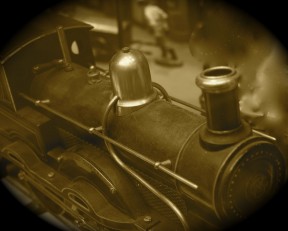
My excitement began to creep up my back as Houdini’s turn on the bill got closer. If he was better than the other acts I watched, then he really had to be something. Lillie had to be right. Jackson Small couldn’t baffle the Great Houdini.
The theatre lights were turned down when Houdini’s turn came. A moving-picture screen was lowered from the ceiling. I heard a picture projector start — I was in the balcony. The moving pictures were scenes from Houdini’s The Grim Game.
The piano player had to play hard and fast to keep up. I hadn’t known Houdini was in the motion pictures, too. As the scenes shifted quickly, I decided I would take Lillie to see the complete picture. Then the projector stopped, the screen raised and the stage lights came on to reveal Houdini himself!
He walked briskly to the footlights and put one foot firmly across them, straddling the lights. His left hand was held behind his back, he raised he right hand in greeting and smiled the most beautiful smile I ever saw — even from the balcony. His voice, deep and friendly, reached me easily, as though he was standing in front of me. He spoke a few words of welcome and asked us to see his new moving-picture.
I surely would.
Houdini then moved his right hand in a sweeping arc from one side to another. “I would appreciate the assistance of a dentist.” His voice was so friendly that you just wanted to help.
As one man near the front started forward, Houdini stepped back across the footlights, only to turn and see another man coming down the other aisle. He smiled. “Ah, good, a second opinion.”
I laughed, so did everyone else. My nervousness over meeting him washed down a bit.
On learning the name of the first dentist to reach the stage, Houdini turned and graciously introduced him to the audience. He did the same when the second dentist arrived.
“I appreciate the help of these gentlemen of science. They will act as your judges.” The magician turned to the first dentist. “Please examine my mouth to assure yourself, and these ladies and gentlemen, that I have nothing hidden in it. No implements to assist me.”
The dentist shifted Houdini around to get better light and peered intently into his mouth, pulling at the cheeks, asking him to raise his tongue. I didn’t understand what was going to happen. The program said: The East Indian Needle Mystery. I had already forgotten all the other acts. It was Houdini’s manner, I think.
“Nothing except a developing gum problem.” Some laughter, but this time Houdini didn’t smile. “Your mouth is totally empty,” the dentist finally declared.
Houdini turned to a uniformed assistant who carried a small tray. From it he took a package of needles like I’ve seen in Lillie’s sewing basket. He pulled the needles from the package and — put them in his mouth! Turning back to the tray, he took a ball of thread, put it into his mouth and with a drink of water, swallowed the tread and needles! Lillie was not going to believe this!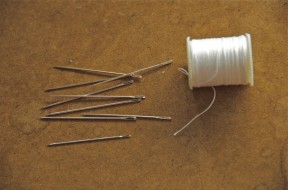
The second dentist verified that Houdini’s mouth was empty. The needles and thread had to be in his stomach. Where else? The magician then gently directed the dentists back to the stairs and to their seats. The audience, who seemed to know what to expect, leaned forward in anticipation.
Now alone on the stage, spotlighted from the big arc-light I could smell behind me, Houdini reached into his mouth and pulled out a thread. He pulled it further until a needle was slowly drawn from his mouth tied to the thread! Then, as Houdini continued to pull the thread, another needle appeared on it, and another. They sparkled in the intense light, as the magician gave the end of the thread to his assistant who began to back slowly away across the stage. With each backward step another needle appeared at Houdini’s lips. Keith’s was silent as a tomb. The stage lights came up gradually as the assistant backed further away. The needles continued to appear at regular intervals glittering on the thread until the assistant reached to far side of the stage. He stopped. Houdini took a step back and pulled the end of the thread from his mouth. The needles and thread stretched all the way across the stage! Holding the end of the thread high in his left hand, he raised his right in a grand sweeping gesture.
“Ladies and gentlemen …” But the applause drowned out his remarks — not, however, his great smile of amicable triumph. I couldn’t believe it! It was totally impossible! No one could tie knots in thread in his stomach! My heart was pounding with the ovation pouring over the stage like a waterfall. I almost forgot why I had come.
The assistant quickly folded the thread and needles, leaving the stage to Houdini who was still acknowledging the acclimation of the astounded crowd. He moved to the center of the stage as the curtains began to rise. The pit orchestra began to play, “Asleep in the Deep”. I remembered it from a concert at the Morgan high school. As the curtains moved up, Houdini dashed off stage, stripping off his jacket as he ran.
In the center of the stage, standing on a large piece of canvas with raised edges like small dikes, was the famous Chinese Water Torture Cell — a large man-sized mahogany box with a plate-glass front to allow the audience to see in.
Two burly assistants in fisherman’s oilskins and boots were filling the Torture Cell with water from a fire hose. They added large buckets of steaming hot water every few minutes, apparently to take the chill off the city water.
Another carried a large red fire ax to a position near the front of the Cell. To break the glass, if necessary, I was told brusquely by the man next to me who didn’t want to be bothered. His curt answer sent chills down my arms and legs. I didn’t know Houdini ever failed.
The Cell was filled, the spot-light swung to the side of the stage to surround the great escape-artist striding briskly to center stage while drawing a bathrobe over the bathing costume he now wore. Several women near me sighed at the sight of Houdini’s bare physique. He looked solid.
At the magician’s invitation, which I wished mightily I could have accepted, several members of the audience went on the stage to inspect the Torture Cell and its steel cover, which was in the form of old Pilgrim stocks. The two holes in the stocks were for Houdini’s feet, I gathered from the pictures in the lobby.
One of the audience committee had his legs clamped into the stocks.
“What size shoes do you take?” asked Houdini.
“Seven and a half,” the man answered. He was unable to free his feet from the stocks until an assistant released him.
The committee stepped back. Now the Chinese Water Torture Cell was for Houdini alone.
He lay prone on the canvas while two assistants padlocked his feet securely into the stocks. Ropes dropped from above the stage were fastened to the frame of the stocks, and with the assistants helping to raise his body, Houdini was hoisted upside-down over the water filled Torture Cell. From the balcony I could see some to the water still sloshing over the backside of the Cell. The orchestra had been silent for some time leaving as the only sounds the snapping of the padlocks and ropes, and the rippling of the oilskins as the assistants moved quickly about their tasks.
Houdini began breathing deeply, flexing his arms as he did, apparently to jam as much air into his lungs as possible. I found myself breathing deeply with him, lost in the spectacle. Once, twice, three times, then he clapped his hands — the frame was dropped!
As he plunged head first into the Cell, the displaced water cascaded in great waves over the sides drenching the oil-skinned assistants as they mounted ladders to padlock the frame and stocks, sealing the escape-artist underwater. Houdini could be clearly seen through the plate glass front. It reminded me of a nightmare. A canopy descended quickly about the Torture Cell as the assistants withdrew. Then the wait began, with the orchestra resuming “Asleep in the Deep”. The suggested fate of the performer weighed heavily on me.
The suspense was unbearable. I had never witnessed anything like Keith’s that evening. My wind suddenly burst from me as I had been holding my breath without realizing it. I heard others gasping as well. This would be beyond description for Lillie.
Almost two minutes had passed, I heard someone whisper. An assistant picked up the giant ax and moved nearer the shrouded Torture Cell. Jackson Small had vanished from my mind. Would Houdini live?
Great shouts of relief went up as Houdini suddenly plunged through the canopy to stand, wet and smiling, before the bewildered and utterly amazed crowd. I yelled as loud as the next guy. The tension was gone, we were on our feet cheering this incredible man.
The canopy had been lifted immediately upon Houdini’s appearance showing the Cell still locked and sealed. As though to prove the water was not drained away to allow the escape, the magician ran up the ladder now placed next to the Cell as the frame and stocks were unlocked and winched up. He sat on top of the Cell kicking and splashing the water while the curtains fell to a loud crescendo from the orchestra.
I was completely drained. I had to sit for a few minutes to collect my thoughts while others climbed over me to leave. Now my job was just beginning.
Showing my badge at the stage door gave me immediate entrance. The bustle, noise and constant movement behind the stage was like nothing before in my life. I glimpsed the Torture Cell still standing on stage like some pagan idol awaiting worship and sacrifice — though it did seem smaller now than from the balcony.
“I’m Vickory. The Boss will see you for a few minutes.”
I found one of the assistants at my elbow drawing me down a short hallway, the door at the end partially ajar. My nervousness was returning.
Harry Houdini was wrapped in a bathrobe, his hair still wet. He sat with his bare muscular legs propped up on a stack of books. Looking up from the letter he was reading, Houdini smiled and put out his hand.
His grip had the power to crush my hand if he had chosen to. His smile was even more compelling close up. His dressing room was heavily cluttered with odd apparatus, some handcuffs, books, correspondence and unrecognizable things. I looked about for a place to light but there wasn’t any.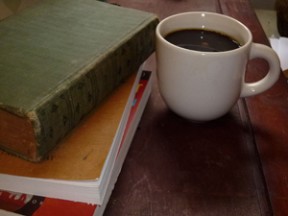
Houdini chuckled as he moved quickly to clear off the top of a trunk. It was then that I first realized that the Great Houdini was actually a very short man. I’m six feet and had a good six inches on him. It was startling. On the stage he seemed so much bigger.
“What can I do for you, Chief Crum?” he asked, his voice deep and friendly. His glistening blue-gray eyes were almost hypnotic. He laid the letter aside, leaned back in his chair, his feet back up on the books. “Go ahead, Chief. What’s your angle?”
He listened with growing interest as I explained my mission. I tried to be brief because I knew he had another show in about an hour or so.
Houdini asked one question: “What make of locks did you install?” When I told him, he smiled: “They are difficult to pick.” My heart stopped. “But only if you have to.” He smiled again as the door opened again. “Bess,” he said to woman who came in, “I’m going out to Morgan, Massachusetts, tomorrow to help Chief Crum here keep a murderer from going free.”
The small dark-haired woman nodded. “All right, Harry. I don’t know what you mean but it sounds important. You have to change.”
He agreed.
I stood up carefully in the cluttered room. “I’ll show you out, Chief Crum,” Bess said, while I endured Houdini’s handshake once more. He didn’t stand but said he would be on the earliest train to allow a return to Boston the same day.
Bess walked me to the stage door, acknowledging greetings from other performers and stage people as we walked. At the door, she looked up at me with large liquid eyes.
“Watch out for Harry, please. He can be impetuous,” She laughed lightly. “We haven’t been introduced. I’m Beatrice Houdini.”
I remembered her large eyes more than the needles and the Torture Cell on the train home. How could I begin to describe to Lillie all that had happened? The program with the torn back cover had become an even more special souvenir.
When Harry Houdini stepped off the train at 6:30 the next morning, the smile was unmistakable. Dressed in a poorly fitting dark rumpled suit with scuffed shoes, he was a small unremarkable visitor that no one seemed to notice. He carried a hat, but didn’t wear it. His powerful grip paralyzed my hand again. 
He had had breakfast, so I headed my car straight for the jail but Houdini said he wanted to see the scene of the crime, where Small had been seen running away.
The Marshall house on Washington Street was dark since its only occupant was now gone. Houdini’s interest, however, was not in the house but in the path leading into the woods across the street.
“That where Small ran?” he asked.
I nodded. “The path follows along the river, and then crosses a small wooden bridge to come out on Water Street.”
“How close is that to the jail?”
“About two blocks.”
“How long would it take to run from here to the jail?” the magician asked.
“I’m not exactly sure. Maybe about eight or nine minutes.” Too long, I had thought for Small to be away from the jail without being noticed.
“Let’s find out.” Houdini slipped off his suit coat and removed his tie and collar. He handed the clothes to me.
“I’ll meet you at the jail.” He had already started down the path at a dead run, leaving me standing with my arms full. Impetuous. Bess was right, I think.
I found Houdini waiting for me at the jail door. Some sweat showed on his brow but he wasn’t breathing hard at all.
“Two minutes, twenty seconds,” he said firmly. “Hardly five minutes for a round trip. Let’s see inside.”
Five minutes — that started me thinking as I offered him his coat, hat, tie and collar, but he shook his head.
“Later,” he said.
I had had Jackson Small taken out for breakfast under guard, so that he wouldn’t know what we were doing. I wondered if he would be so cocky, arrogant and foul-mouthed if he knew he was now up against the Great Houdini.
The escape-artist quickly walked through the cells, opened the back door, looked out and slammed it shut.
“Lock my clothes in the cell at the far end, and lock me in Small’s cell. Wait for me up front in your office.”
I did as he asked. He was smiling that wonderful smile through the bars as I closed the cell door. With Corporal locks you don’t have to use a key to lock the door, it just snaps shut automatically. Saves time, especially if you have a hard-to-handle prisoner. I went out to my office, the jail door clanging shut behind me.
One minute and three seconds later by the new electric clock on my wall, a happily grinning, fully dressed Harry Houdini with his hat on stood in my office. My jaw would have hit the floor if it had dropped any further. I didn’t know what to say. Houdini though obviously enjoyed my reaction. He had opened two cells, dressed, opened the lock on the back door, run all around the police station and into my office in 63 seconds! My God, I just didn’t know what to think.
“I have never done this for anyone before and you must promise never to reveal that Houdini told you. Come and I’ll show you how Jackson Small could murder and still be in your jail.” Houdini led me back to my own jail where the two cell doors and the back door were standing open. “If this was my regular jail break,” he confided, “I would have locked everything back up, but this is different.”
He led me to Small’s cell. “Corporal locks are spring-loaded,” he said.
I saw a small block of wood painted black pressed into the striker plate when he pointed to it.
He slammed the cell door shut. “Locked?” Houdini didn’t wait for an answer. He simply jerked the barred door back open.
Now I understood. The wood plug wouldn’t let the bolt strike home. The lock never locked, even though it looked it.
“Corporal striker plates are all the same size, so I made up some plugs after the last show last night … always out of hard maple, never soft wood. Paint’m black so they look like shadows.”
I looked at the other cell, then the back door with its new Corporal lock — black wood plugs in both of them. I was stunned. My new jail security was like Swiss cheese.
Houdini was still talking. “Small needed to be alone less than, say six minutes, to get out of the cell, run to Marshall’s, kill him, and run back. After dinner and after dark no one would bother him much in the cell, and no one would see him run to the Marshall place — except your sharp-eyed nurse. The wood plugs wouldn’t be noticed — I know that from experience.” He grinned. “He would just throw them away and lock the door on his alibi.”
Thunderation, if that wasn’t so! Now I remembered seeing Small, who was a big muscular man, going through the jail when I had it open for public inspection, so the tax-payers could see the new locks and painting we had done. He must have gotten his measurements for the plugs then. There were a lot of people who wanted to be in jail that day. The cell doors were opening and closing all day.
Houdini agreed. “Only take a few seconds with a lump of wax to get an impression. Why was he jailed, anyway? What kind of store did he run?”
“Hardware and dry goods,” I answered first. “Drunk and disorderly, cussing a police officer and the judge. Just kept it up until His Honor hit the ceiling. Judge wouldn’t fine him. Said only thirty days in the hoosegow was right.” I saw everything now. He had done it on purpose to get a real iron-clad alibi for killing Jasper Marshall. Hate can totally destroy a man, I think.
Before stepping on the Boston train, Houdini explained some changes Corporal was making in their locks to double lock them. “Shouldn’t cost much to have your locks changed. Corporal should be eager to help.” 
He was right.
I searched and found a small black maple wood plug outside Small’s cell window. He was astonished when I arrested him for murder. When Small was convicted a month later, I was congratulated by the judge and the Morgan Clarion for superb police work. Houdini’s name was never mentioned, as he had asked.
In the letter Houdini sent to me after I wrote him about the results of the trial, he said: “All that I do is illusion, only illusion, while you must always deal with reality. It was good to do something real — and helpful. Anyway, the Great Houdini gets all the publicity he wants.”
Even in death, Harry Houdini had that special presence and timing I remembered from that amazing time at Keith’s. When he died three years later, it was on Halloween, 1926. What more appropriate day for the master magician of the century? The whole country was saddened — but for Lillie and me … well, we cried a lot. The Great Houdini was a special, special man, I think.
Author’s Note: The description of Houdini is based on conversations between the author and Walter B. Gibson several years ago. Gibson is, of course, well known as the creator of The Shadow, but he was as well the confidante of and ghost writer for the great magicians and mentalists of the time: Houdini, Thurston, Blackstone, Sr., and Joseph Dunninger. Gibson himself, a gentle and generous man, was a unique character.
Check out other mystery articles, reviews, book giveaways & short stories in our mystery section.




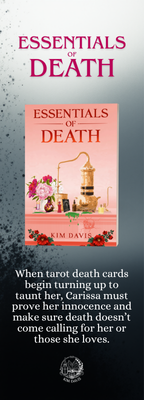


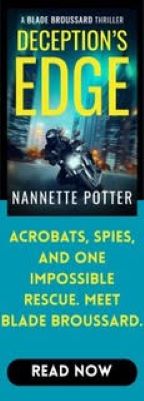








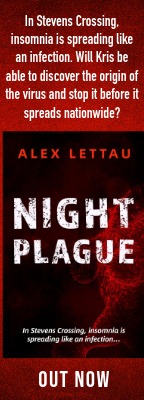
Who knows what evil lurks in the hearts of men? Thank you – terrific story.
Great story. Adding a bit of history to a fiction story is sheer genius. Who knows what real and what’s imagined. Well written and a great conclusion. Thank you for sharing.
For lovers of magic, this story is well written and causing the reader to sit on the edge of his chair and hold his breath as he reads the famous water trick of Houdini. Very good. I loved it.
Terrific story! Great history, too!